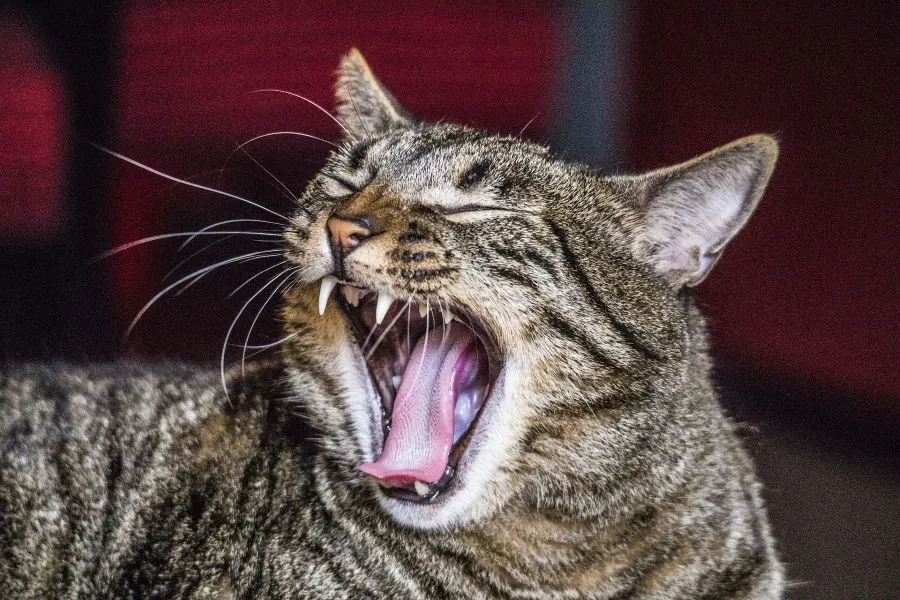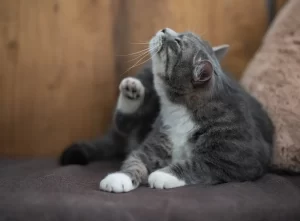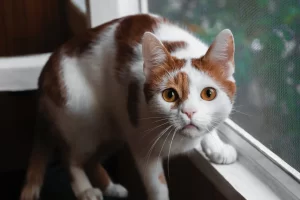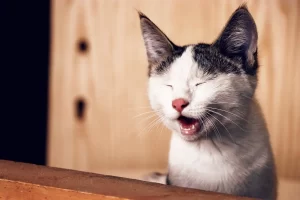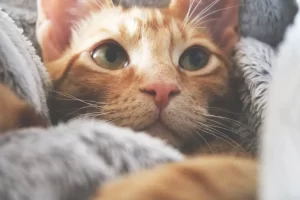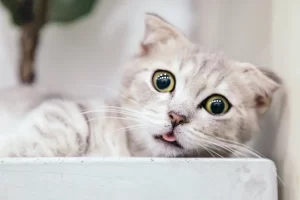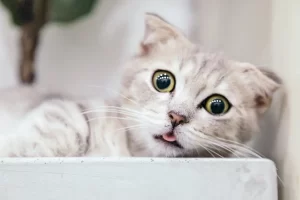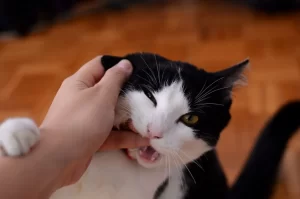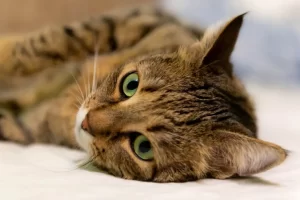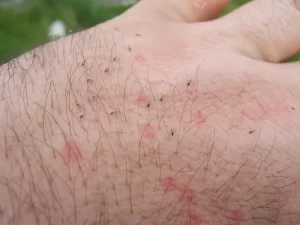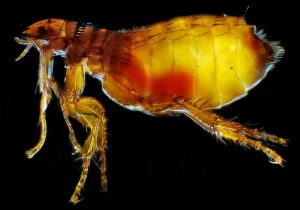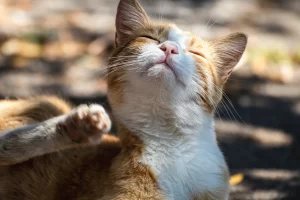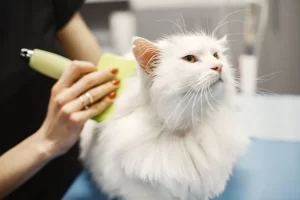Cats are known to occasionally vomit as part of their natural grooming behavior or due to minor digestive disturbances. However, not all types of cat vomit are harmless, and some may indicate underlying health issues that require prompt veterinary attention. As a responsible cat owner, it’s crucial to be aware of the different types of cat vomit and understand when it may be a cause for concern. In this article, we will explore the various types of cat vomit and highlight the potential dangers associated with them. We will also discuss when it’s important to seek veterinary care for your feline companion to ensure their health and well-being. Here are more related articles that you may be interested in:
Table of Contents
ToggleDifferent Types of Cat Vomits
Hairball vomit:
Cats are known to groom themselves by licking their fur, which can lead to the accumulation of hair in their stomach. This can result in hairball vomit, which is typically cylindrical in shape and may be covered in mucus. It’s usually harmless unless it becomes frequent or causes an obstruction in the digestive tract.
Food-related vomit:
Cats may vomit after eating too quickly or ingesting something that doesn’t agree with their stomach. Food-related vomit can vary in appearance depending on what the cat has eaten, but it’s usually undigested food mixed with stomach fluids. It may be a one-time occurrence, but if it happens frequently, it could indicate an underlying issue such as food allergies or intolerances. On the other hand, other reasons may be responsible for a cat that vomits but does not eat.
Bile vomit:
Bile is a yellowish-green fluid produced by the liver and stored in the gallbladder, and it helps with digestion. Cats may vomit bile when their stomach is empty, and it can appear as a yellow or greenish fluid. Bile vomit may be a sign of an empty stomach, but it can also indicate gastrointestinal issues, such as inflammation or irritation.
Clear or foamy vomit:
Cats may vomit clear or foamy fluid, which can be caused by excess stomach acid or irritation of the stomach lining. It may be a result of vomiting on an empty stomach, or it could indicate a more serious condition such as gastritis or gastroesophageal reflux disease (GERD).
Blood or bloody vomit:
Vomit that contains blood or appears to be bloody can be alarming and may indicate a serious issue. It can be caused by various conditions, such as gastrointestinal bleeding, ingestion of a foreign object, or stomach ulcers. Blood or bloody vomit should be considered an urgent medical concern, and immediate veterinary attention is necessary.
Regurgitation:
Regurgitation is not the same as vomiting. It is the passive expulsion of undigested food from the esophagus, often without warning, and it is typically undigested and may be tube-shaped. Regurgitation can be caused by various conditions, such as esophageal disorders, swallowing difficulties, or congenital abnormalities.
Fecal or feculent vomit:
Fecal vomit is a rare but serious condition where a cat vomits fecal matter. It can be caused by an obstruction in the intestines, often due to a condition called colonic or rectal inertia, where the colon or rectum fails to move feces properly. Fecal vomit may have a foul odor and is usually a sign of a severe gastrointestinal issue that requires immediate veterinary attention.
Yellow or orange vomit:
Vomit that appears yellow or orange in color can be indicative of issues with the liver or gallbladder. Liver diseases, such as hepatic lipidosis or cholangitis, can cause the vomit to have a yellow or orange hue. These conditions can be serious and require veterinary evaluation and treatment. See a full list of cat vomit colors or check out the cat vomit color chart.
Frothy vomit:
Frothy vomit is characterized by vomit that appears to be foamy or bubbly. It can be caused by excess stomach acid, rapid ingestion of food or water, or swallowing air while eating. Frothy vomit is typically not considered dangerous, but if it occurs frequently or is associated with other symptoms, it’s best to consult a veterinarian.
Bilious vomiting syndrome:
Bilious vomiting syndrome is a condition where cats vomit bile frequently, often in the morning or when their stomach is empty. It’s not fully understood why this occurs, but it’s thought to be related to an overproduction of bile. Bilious vomiting syndrome is typically not dangerous but may require dietary management or medication to control the symptoms.
Vomiting in Cats: Understanding Potential Danger and When to Seek Veterinary Care
Here are some signs that may indicate that your cat’s vomiting may be dangerous and warrant a visit to the vet:
- Frequent or persistent vomiting: If your cat is vomiting frequently or if the vomiting continues for an extended period of time, it may indicate an underlying issue that requires medical attention.
- Blood or bloody vomit: Vomit that contains blood or appears to be bloody can be a sign of gastrointestinal bleeding or other serious conditions, and it should be considered an emergency. Blood or bloody vomit should prompt an immediate visit to the vet.
- Lethargy or weakness: If your cat is vomiting and also exhibiting signs of lethargy, weakness, or decreased appetite, it may indicate a more severe condition that requires prompt veterinary evaluation.
- Dehydration: Cats can become dehydrated quickly, especially if they are vomiting frequently. Signs of dehydration may include dry gums, sunken eyes, decreased skin elasticity, and lethargy. If your cat is vomiting and also showing signs of dehydration, it’s important to seek veterinary care promptly.
- Change in behavior or other symptoms: If your cat’s vomiting is accompanied by other concerning symptoms such as diarrhea, abdominal pain, difficulty breathing, or changes in behavior or appetite, it may indicate a more serious underlying issue and should be evaluated by a vet.
- Ingestion of a foreign object: If you suspect that your cat has ingested a foreign object, such as a toy, string, or other non-food item, and your cat is vomiting, it may indicate an obstruction in the digestive tract that requires immediate veterinary attention.
Frequently Asked Questions (FAQs) about Cat Vomiting or Throwing Up
Why is my cat vomiting?
There are many potential causes of cat vomiting, including dietary changes, eating too quickly, ingesting hairballs, food intolerance, gastrointestinal issues, infections, parasites, foreign object ingestion, and more.
Is it normal for cats to vomit occasionally?
Yes, occasional vomiting in cats can be normal, especially if it’s infrequent and not accompanied by other concerning symptoms. Cats may vomit to expel hairballs, clear their stomachs, or due to minor digestive upsets.
When should I be concerned about my cat vomiting?
You should be concerned if your cat is vomiting frequently, has bloody vomit, is lethargic or weak, shows signs of dehydration, has difficulty breathing, or exhibits other concerning symptoms.
Can stress or anxiety cause my cat to vomit?
Yes, stress or anxiety can trigger vomiting in cats. Cats are sensitive creatures, and stressors such as changes in routine, new environments, or other sources of anxiety can lead to vomiting.
Can certain foods or treats cause my cat to vomit?
Yes, some cats may have food intolerances or allergies that can cause vomiting. Additionally, giving your cat table scraps or treats that are high in fat or other potential irritants can also trigger vomiting.
Is it safe for my cat to eat grass?
Cats often eat grass to help induce vomiting and expel hairballs or other irritants from their stomachs. However, consuming excessive amounts of grass can also cause vomiting or other digestive issues.
Should I be concerned if my cat vomits hairballs?
Vomiting hairballs occasionally is normal for cats, especially those with long fur. However, if your cat is vomiting hairballs frequently or has difficulty passing them, it may require veterinary attention.
Can my cat vomit due to hairball blockage?
Yes, hairballs can sometimes cause blockages in the digestive tract, leading to vomiting and other symptoms. If you suspect a hairball blockage, consult your vet for appropriate treatment.
Can my cat vomit due to eating too quickly?
Yes, cats that eat too quickly can vomit as a result of overeating or swallowing air. Slow feeding or using food puzzles can help prevent this issue.
Is it normal for my cat to vomit after a sudden change in diet?
Abrupt changes in a cat’s diet can upset their digestive system, leading to vomiting. It’s best to gradually transition your cat to a new diet to minimize the risk of vomiting.
Can my cat vomit due to gastrointestinal issues?
Yes, cats can develop gastrointestinal issues such as gastritis, gastroenteritis, or inflammatory bowel disease that can cause vomiting. If vomiting persists, consult your vet for a proper diagnosis and treatment plan.
Can my cat vomit due to infections or parasites?
Yes, certain infections or parasites such as viral or bacterial infections, gastrointestinal worms, or protozoan parasites can cause vomiting in cats. A vet can determine the underlying cause and provide appropriate treatment.
Is it dangerous if my cat vomits blood?
Vomiting blood, also known as hematemesis, can indicate a serious condition such as gastrointestinal bleeding or other underlying health issues. It requires immediate veterinary attention.
Can my cat vomit due to ingesting a foreign object?
Yes, cats may vomit if they have ingested a foreign object such as a toy, string, or other non-food item. If you suspect your cat has ingested a foreign object, contact your vet immediately.
Can my cat vomit due to food poisoning?
Yes, cats can experience food poisoning from consuming spoiled or contaminated food, which can lead to vomiting, diarrhea, and other gastrointestinal symptoms. If you suspect your cat has ingested spoiled or contaminated food, contact your vet immediately.
Can my cat vomit due to a medication or toxin ingestion?
Yes, certain medications, toxins, or household chemicals can cause vomiting in cats if ingested. It’s essential to keep medications, cleaning products, and other potentially toxic substances out of your cat’s reach to prevent accidental ingestion.
Can my cat vomit due to a serious underlying health issue?
Yes, vomiting can be a symptom of serious underlying health issues such as organ dysfunction, metabolic disorders, cancer, or other systemic diseases. If your cat’s vomiting is persistent or accompanied by other concerning symptoms, consult your vet for a proper diagnosis.
Can my cat vomit due to motion sickness?
Yes, just like humans, some cats can experience motion sickness while traveling in a car or other moving vehicles, leading to vomiting. Discuss with your vet if your cat shows signs of motion sickness during travel.
Can my cat vomit due to allergies or sensitivities?
Yes, some cats may develop allergies or sensitivities to certain foods, treats, or environmental factors, which can cause vomiting. Identifying and avoiding the allergen or trigger can help prevent further episodes of vomiting.

